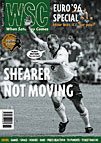 Harry Pearson saw France come to Newcastle (well, Northumberland).
Harry Pearson saw France come to Newcastle (well, Northumberland).
“Can you believe this?” David Thompson, headmaster of Haydon Bridge High School is saying. He has a mobile phone in one trouser pocket and a walkie-talkie in the other. The walkie-talkie occasionally bursts into life with a noise like a 60-a-day smoker waking up after a heavy session. When it does, David Thompson ignores it. It is not his walkie-talkie. He has been given it to look after by one of the Euro security men who are currently scouring the back of the cricket pavilion for Arab terrorists.
Behind Thompson, on the school playing field, the French squad are amusing themselves by whacking volleys at a TV1 cameraman perched on top of a scaffolding gantry; over in the corner Aimé Jacquet is being interviewed by Canal+, whose production team seems to consist entirely of leather-clad blonde women who look as if they might once have been married to Rod Stewart; another camera crew is rushing about taking shots of black-faced sheep, border terriers and kids wearing Newcastle United shirts with the name Ginola on the back.
A tricoleur flaps above the sports hall, now converted into an international media centre, the car park is full of tinted windowed transit vans with satellite dishes on the top, men in raybans and moustaches lounging up against the sides of them watching make-up women powder-puffing the bronzed cheeks of the TV football correspondents.
“Isn’t it fantastic?” David Thompson says, “Can you believe it?” It is the first Sunday of Euro ’96 and three miles away from my house they are broadcasting live to France. Can you believe it? Well, yes. Though only after a considerable effort.
Maybe this will seem small beer to those of you who live in Britain’s more cosmopolitan cities. A few foreign camera crews, so what? But Haydon Bridge is in western Northumberland, the heart of a region which has been described, by no less of an authority than David Bellamy, as “England’s Last Wilderness”.
The appearance of the French football team might not raise an eyebrow in London, Birmingham or Manchester, but in an area where the local paper once ran a front page story headlined Drunk Man Held Up Daffodil it is enough to set people bouncing in their chairs with child-like glee.
In the week before the French arrive, signs go up in local newsagents: “Nous vendons les magasins Francaise”. L’Equipe and France Football vie for shelf space with Farmer’s Weekly and the Westmorland Gazette; red, white and blue bunting appears everywhere, road signs directing French journalists are tied to lamp posts and a TV broadcasting station is set up in a car park next to the ruins of a Roman fort.
Not everyone is pleased, of course. Northumberland is a farming county and the sight of the tricoleur is a red rag to many cattlemen. Rumour has it that the large poster naming the French squad had to be removed from the sports hall/media centre at the High School after an irate pupil wrote “Anglais!!” after the name of Strasbourg defender Franck Leboeuf.
In the main, though, people are delighted. If you live in rural England most of the time you have to go to the world, so it’s nice if once in a while the world comes to you.
On the playing field the school caretaker is holding forth to a small crowd of people. The caretaker has had considerable discussions with the French management about their needs and has become quite an expert on the squad. “This big lad’s up for a place in the starting line-up,” he says indicating Jocelyn Angloma. “But that fella,” he points to a player undergoing a fitness test, “He’s not going to be healed in time. It’s just a formality is that.”
“When are you going to announce your team for the Romania match, then” someone asks him, a touch sarcastically.
The caretaker pauses, then says “’Bout an hour before kick-off. I like to keep the opposition guessing.” The caretaker, like Tynedale itself, having unexpectedly found himself at the centre of attention is determined to have a bit of fun out of it.
From WSC 114 August 1996. What was happening this month